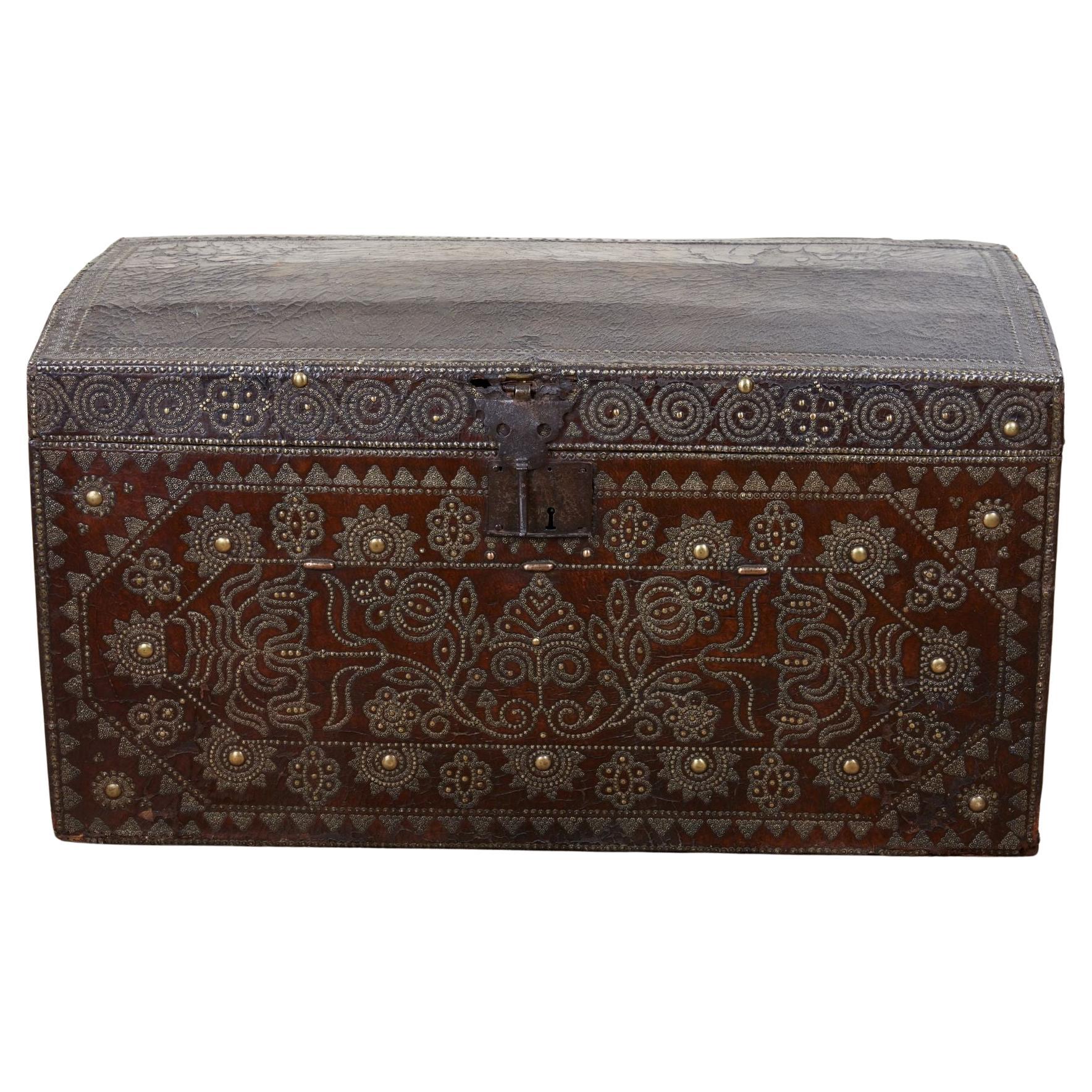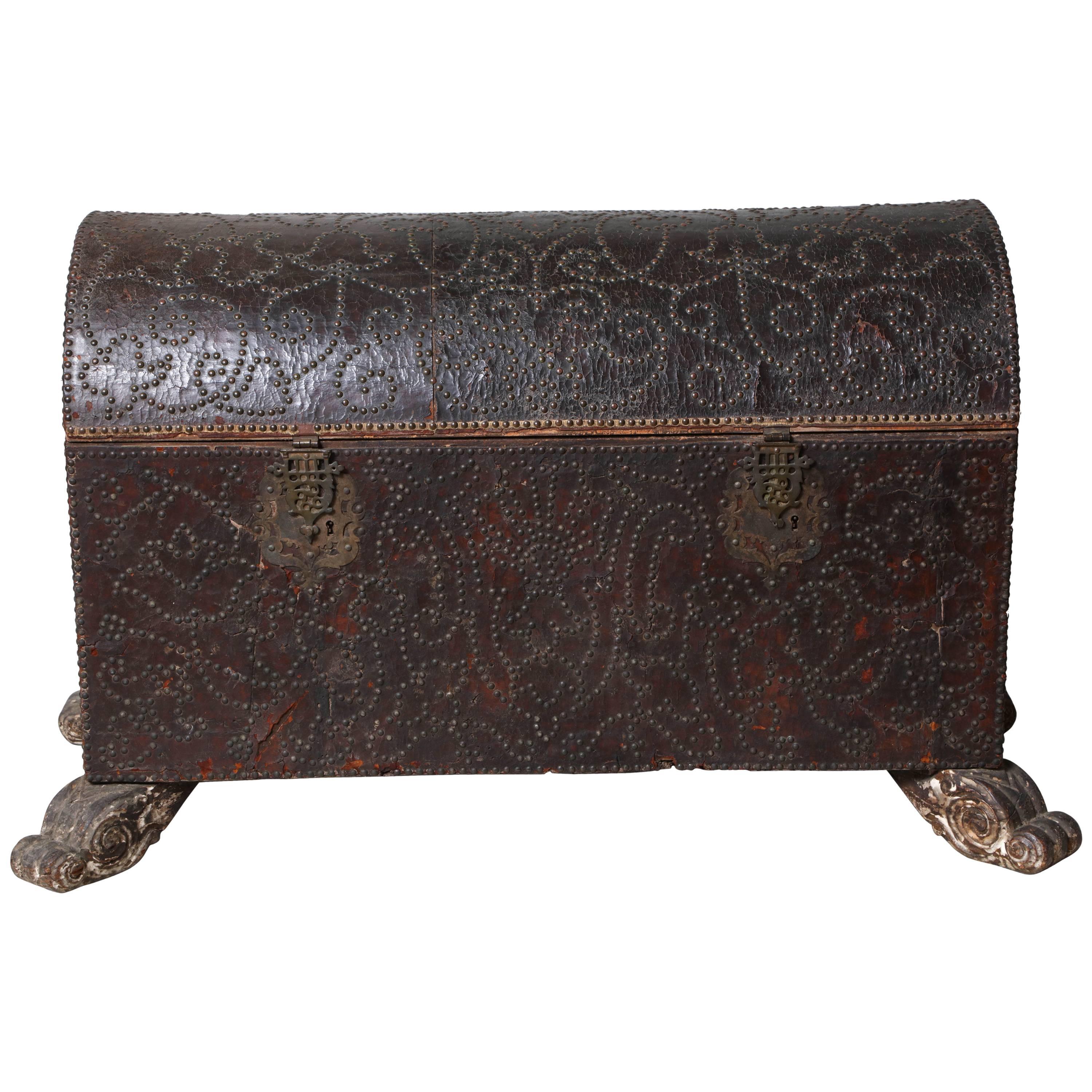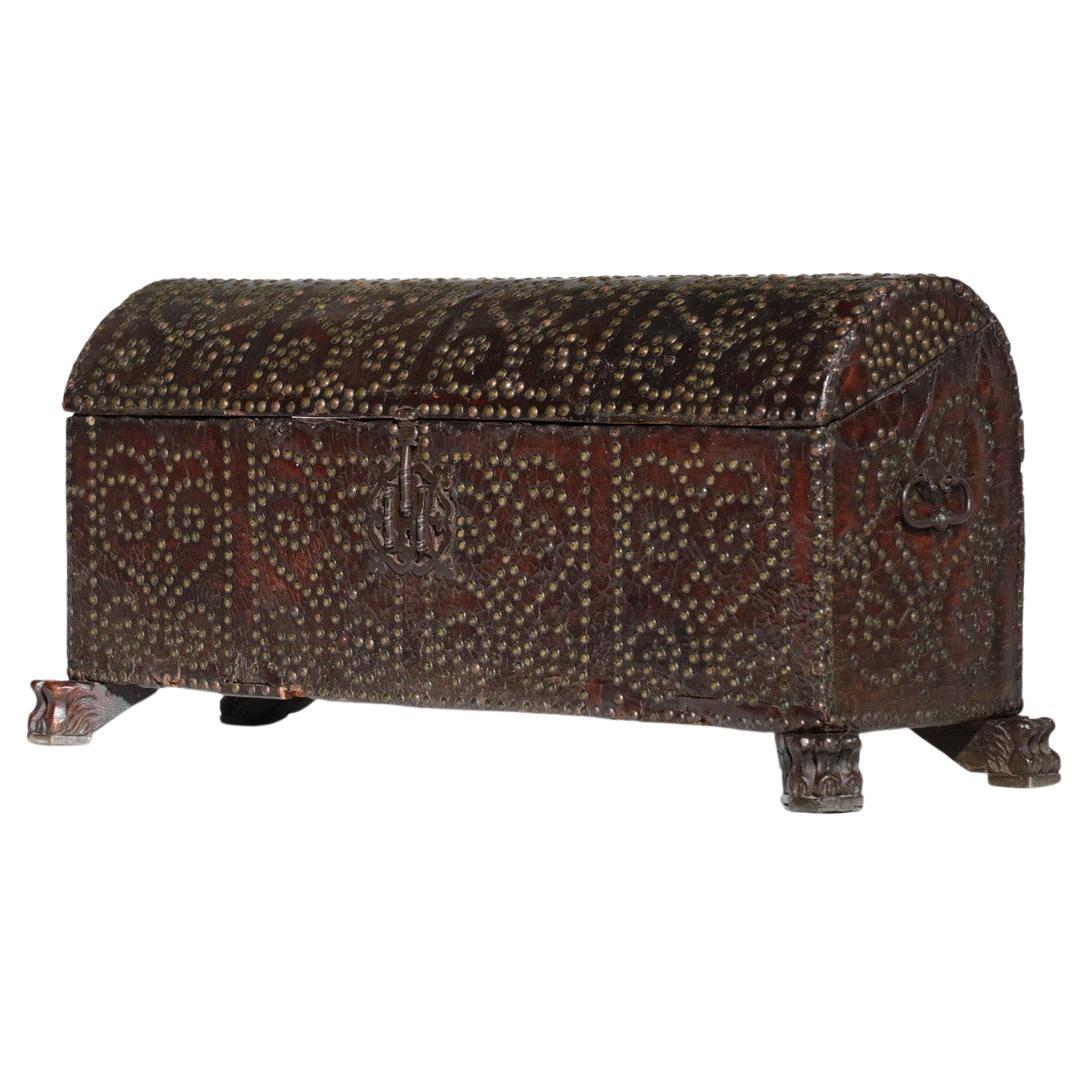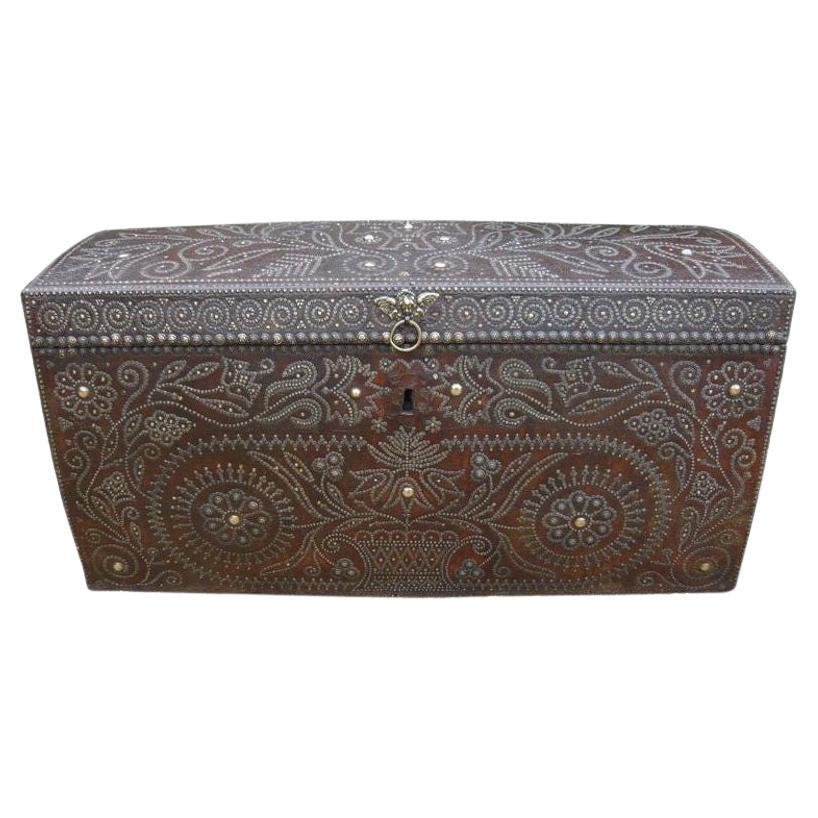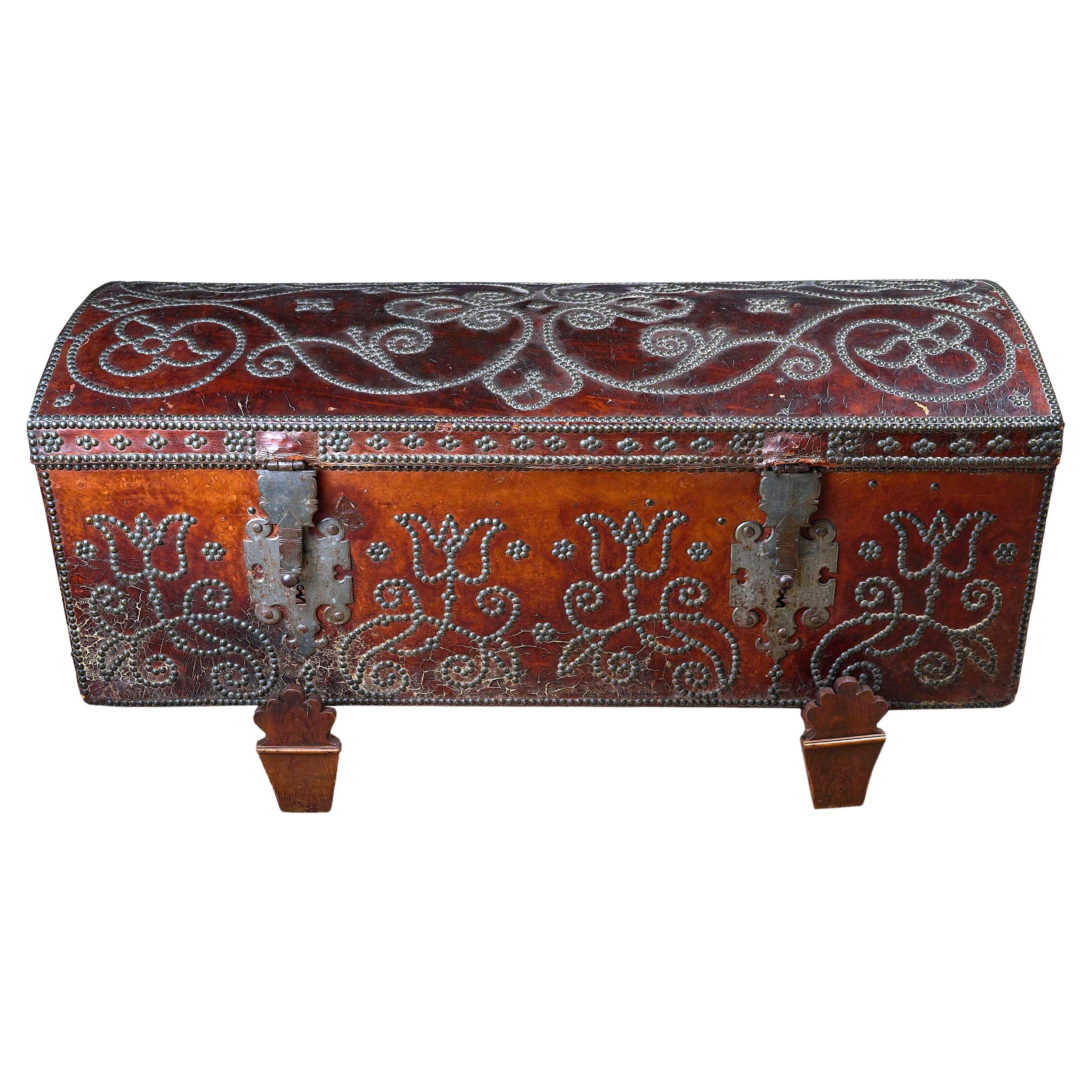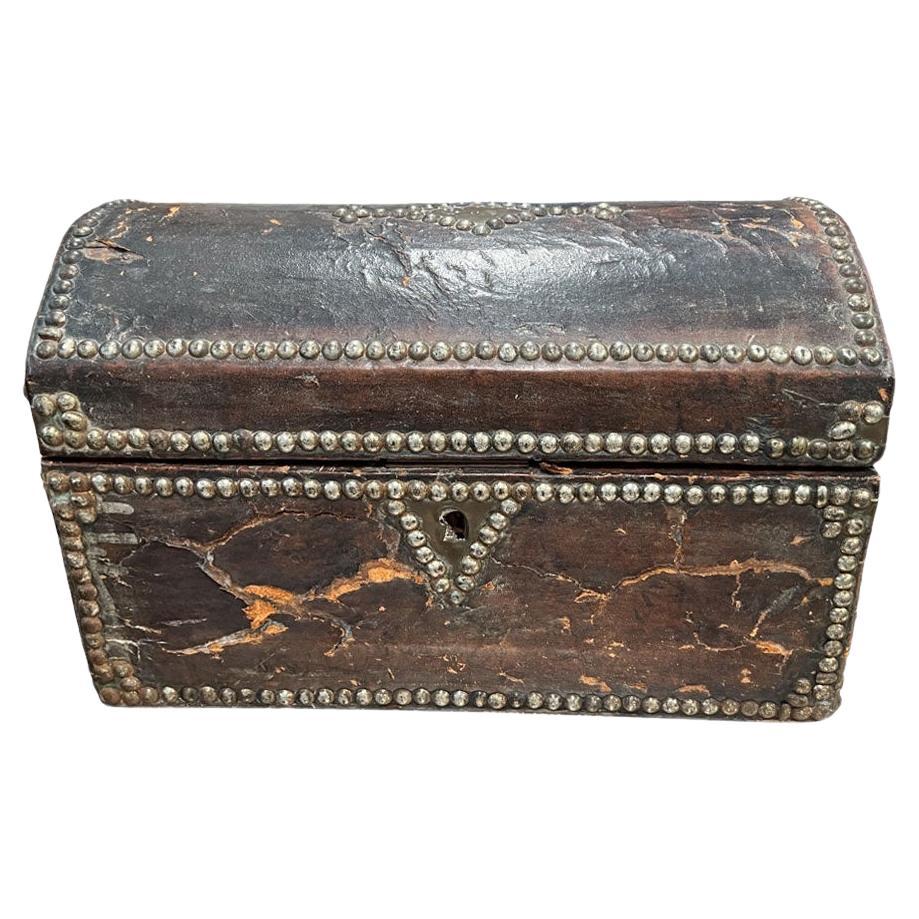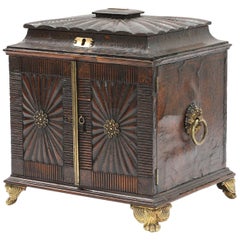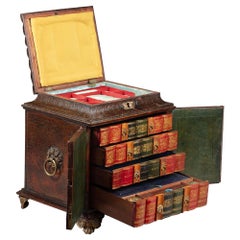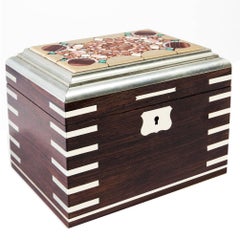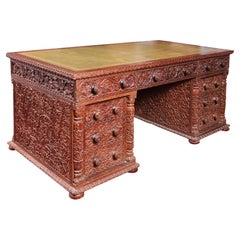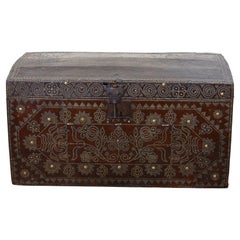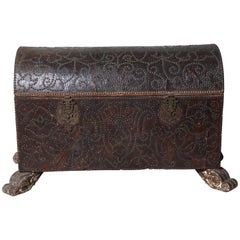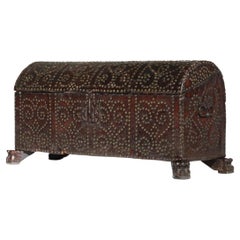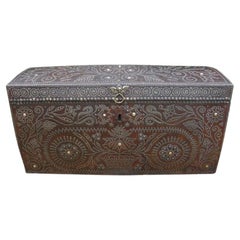Items Similar to 17th century leather studded travellers Chest
Want more images or videos?
Request additional images or videos from the seller
1 of 9
17th century leather studded travellers Chest
$3,446.53
£2,500
€2,919.36
CA$4,765.44
A$5,231.86
CHF 2,729.47
MX$63,312.76
NOK 34,209.68
SEK 32,234.52
DKK 21,792.28
About the Item
A large French 16th Century Beech wood & leather chest, with iron flowerhead and domed stud work to front top and sides. Original hasp and lockplate, the interior of the box with later decorated silk lining.
Origin France Late 16th / 17th Century
Stock Number: 82549
Timeless Elegance: A 16th/17th Century French Leather-Bound Traveling Chest
We are delighted to present this 16th / 17th-century French travelling chest. The chest is bound in rich, aged leather that exudes an undeniable charm, telling tales of its many travels over the centuries. It is a remarkable fusion of functionality and elegance.
The chest with a hinged domed lid is adorned with flowerhead and domed metal studs, creating a pattern of trailing floral details and the initials M.T that not only enhances its aesthetic allure but also serves as a testament to the craftsmanship of the period. The studs, each bearing the touch of time, add a tactile element to the chest, inviting touch as much as sight.
Upon opening the chest, one is greeted with generous storage space, a silent nod to its original purpose as a travelling companion.
The chest sits flat on a tabletop, ensuring simplicity of form and stability. The worn leather, the time-softened studs, and the sturdy supports come together to create a piece that is as visually striking as it is historically significant.
- Dimensions:Height: 15.3 in (38.87 cm)Width: 21.2 in (53.85 cm)Depth: 10.6 in (26.93 cm)
- Style:Baroque (Of the Period)
- Materials and Techniques:
- Place of Origin:
- Period:Early 17th Century
- Date of Manufacture:1700
- Condition:Wear consistent with age and use.
- Seller Location:London, GB
- Reference Number:1stDibs: LU1204239953842
About the Seller
4.9
Vetted Professional Seller
Every seller passes strict standards for authenticity and reliability
Established in 2012
1stDibs seller since 2015
118 sales on 1stDibs
Typical response time: 1 hour
- ShippingRetrieving quote...Shipping from: Painswick, United Kingdom
- Return Policy
Authenticity Guarantee
In the unlikely event there’s an issue with an item’s authenticity, contact us within 1 year for a full refund. DetailsMoney-Back Guarantee
If your item is not as described, is damaged in transit, or does not arrive, contact us within 7 days for a full refund. Details24-Hour Cancellation
You have a 24-hour grace period in which to reconsider your purchase, with no questions asked.Vetted Professional Sellers
Our world-class sellers must adhere to strict standards for service and quality, maintaining the integrity of our listings.Price-Match Guarantee
If you find that a seller listed the same item for a lower price elsewhere, we’ll match it.Trusted Global Delivery
Our best-in-class carrier network provides specialized shipping options worldwide, including custom delivery.More From This Seller
View AllRegency Tooled Leather Desktop Secretaire Cabinet
Located in London, by appointment only
A Regency tooled leather work desktop secretaire cabinet, the hinged lid enclosing a partitioned compartment, the moulded doors enclosing four drawers with faux book spine fronts, th...
Category
Antique Early 19th Century English Regency Decorative Boxes
Materials
Leather
$4,301 Sale Price
20% Off
Regency Leather Jewelry, Work and Writing Casket
Located in London, by appointment only
A Regency leather jewelry, work and writing casket,
the hinged lid enclosing a partitioned compartment, the moulded doors enclosing four drawers with faux book spine fronts, the low...
Category
Antique Early 19th Century English Regency Jewelry Boxes
Materials
Leather
Carlsbad Bohemian Hardstone Inlaid Rosewood and White Metal Casket Box
Located in London, by appointment only
Bohemia, circa 1870.
This exceptional 19th century antique casket originates from Carlsbad, a spa town in the west Bohemia region of the Czech Republic. The town is officially known as Karlovy Vary and gained fame as a destination during the 19th century.
Its piping hot springs drew tourists from across Europe to 'take the waters' and their health benefits. The highly figured stones used on this exceptional box were locally sourced and are specific to the hot mineral rich springs of Carlsbad. Close inspection will reveal layer on layer of fine mineral...
Category
Antique 1880s Czech Napoleon III Decorative Boxes
Materials
Agate, Marble
Anglo Indian Teak Carved Pedestal Desk
Located in London, by appointment only
A late 19th century Anglo Indian Pedestal desk, profusely decorated with scrolling vines with abundant leaves and fruit. The desk carved on all sides, with two banks of three drawers...
Category
Antique Late 19th Century Indian Furniture
Materials
Teak
Indian Bronze Ships Prow Caping Piece from a Luang Boat
Located in London, by appointment only
A rare Luang River boat bronze prow. This beautifully decorative piece of metal work was once the prow of a Luang River boat from South India. It is the most extraordinary piece of m...
Category
Antique 18th Century Indian Agra Balustrades and Fixtures
Materials
Bronze
Fine Regence, Louis XV, Baroque or Rococo Marquetry Cabinet Buffet
Located in London, by appointment only
A wonderfully rich and decorative early 18th century marquetry buffet cabinet of generous proportions, veneered in highly figured timbers and retaining its original scalloped marble-...
Category
Antique Early 18th Century French Cabinets
Materials
Fruitwood
You May Also Like
Studded Leather Travel Chest
Located in Greenwich, CT
Very fine early 18th century leather travel chest or trunk in beautiful brass and iron studded Spanish leather, having elaborate geometric floral ...
Category
Antique Early 1700s Spanish Trunks and Luggage
Materials
Leather
$12,900
18th Century Spanish Studded Leather Chest
Located in Greenwich, CT
Very good Spanish 18th century studded leather chest, the domed lit with Arabesque design stud work, the front with two pierced brass clasps and ...
Category
Antique Early 18th Century Spanish Baroque Blanket Chests
Materials
Brass
19th Century Trunk in Studded Leather and Solid Wood
Located in Ternay, Auvergne-Rhône-Alpes
Chest, trunk of the 17th century in a medieval style, work of art craftsmanship. Solid wood structure covered with leather completed by a precision work with the decoration on the whole trunk made with nails. Very nice detail of carving at the feet in the form of paws. Bet vintage...
Category
Antique Mid-18th Century French Medieval Trunks and Luggage
Materials
Metal
Elaborately Decorated 17th Century Studded Leather Traveling Trunk
Located in Greenwich, CT
A fantastic 17th century Dutch traveling trunk in russia leather with elaborate brass stud decoration to front and top in the form of swirling flowers in geometric patterns with central winged cherub pull plate...
Category
Antique 17th Century Dutch Trunks and Luggage
Materials
Brass
Spanish Leather and Studded Decorative Trunk on Original Stand
Located in Round Top, TX
The best leather and studded decorative trunk on original stand. Rare and in excellent condition. Wonderful color and patina.
Category
Antique 1780s Spanish Trunks and Luggage
Materials
Iron
18th Century Antique Leather Box with Nailheads
Located in New Orleans, LA
This antique leather box with nailheads is not only a beautiful decorative item but also a functional piece of history. It could have been used for a variety of purposes, such as sto...
Category
Antique 18th Century French Decorative Boxes
Materials
Brass
More Ways To Browse
Studded Furniture
Studded Leather Antique
16th Century Wood Chest
Leather Travel Chest
Ceramic Trinket Boxes
Horn Ivory
Ivory Boxes Antique
Tramp Art Box
Antique Bentwood Box
Antique Stationery Box
Apple Box
Cigarette Box Wood
Engraved Bone
Italian Casket
Japanese Enamel Box
Match Box Vintage
Patch Box
Post Office Boxes
